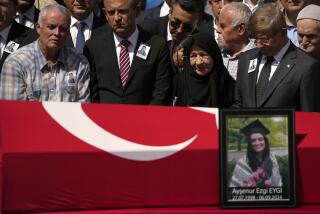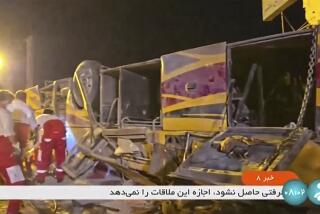Sunni sheik is laid to rest in Anbar
Thousands of people paid respects Friday to the slain sheik credited with forging ties between Sunni tribesmen and the U.S. military, as American leaders mulled over the prospects of his expected successor.
The U.S. military reported that four U.S. soldiers were killed in Diyala province by an explosion near their vehicle. No names were released pending notification of their families, and no further details were available.
The insurgent group Al Qaeda in Iraq on Friday posted an Internet statement claiming responsibility for the killing of Abdul Sattar Rishawi, who had persuaded Sunni Muslim tribes in Anbar province that once backed the insurgency to accept U.S. cooperation and arms to fight militants.
The killing of Rishawi on Thursday in a bombing outside his home was a setback to U.S.-led efforts to stabilize Anbar, which President Bush has cited as a success of the military buildup he ordered this year.
The slain sheik’s tribal coalition, the Anbar Salvation Council, will reportedly be taken over by his elder brother, Ahmed Rishawi, who lashed out against insurgents for the killing. “We are going to continue our fight and avenge his death,” he said.
At the Pentagon, Army Col. Sean B. MacFarland predicted that with Abdul Sattar Rishawi’s death, others would vie for increased influence over the Anbar council, but that they would remain U.S. allies.
“There will be a different kind of leadership,” he said, more diffuse but still united.
MacFarland, as commander of the 1st Armored Division’s 1st Brigade, led U.S. forces in the provincial capital, Ramadi, in 2006 and helped broker the deal between U.S. forces and Rishawi last September.
Sunni insurgents had declared Anbar part of their self-proclaimed Islamic State of Iraq, subject to draconian laws and harsh punishment. Resentment was growing among tribal leaders, who saw their influence and power eroding.
Rishawi “saw his opportunity for revenge and he took it,” MacFarland said. The sheik, also known as Abu Risha, succeeded in persuading leaders of the other Sunni Arab tribes in the region to rally to his side and ally with the U.S.
The Rishawi brothers were a striking contrast, said MacFarland: Abdul Sattar in traditional clothing, a charismatic risk-taker; and the college-educated Ahmed in Western suits, a businessman and deal maker.
Abdul Sattar Rishawi’s critics said he took too much credit for turning back the insurgents in Anbar and that his ambition alienated other tribal leaders. His success in leveraging funding and weapons for his council from U.S. and Iraqi sources had not gone unnoticed.
Ahmed, who holds a degree in political science, “will have more of a consensus type of approach, where Sattar was more, ‘My way or the highway,’ ” MacFarland said.
Rishawi, already praised as a martyr, will have a lasting influence, he said: “more powerful in death than in life.”
An estimated 1,000 people attended Rishawi’s funeral Friday, paying respects to one of the few Sunni tribesmen who spoke of reaching across sectarian lines. He had hoped to use his successes in Anbar as the basis for an entry into national politics. He had formed a party, the Iraqi Awakening Conference, and traveled in June to Baghdad to meet with Shiite Muslim leaders.
Mourners included the Defense and Interior ministers in Prime Minister Nouri Maliki’s Shiite-dominated government.
“Rishawi is a national hero,” said national security advisor Mowaffak Rubaie. Bush sent his condolences through the U.S. ambassador in Jordan.
Rishawi knew he was on dangerous ground, throwing his lot in with U.S. forces and even posing with Bush last week during the president’s one-day visit to Anbar. But if he had any fears, he kept them hidden.
“I’m not scared,” he said, as he acknowledged to The Times in June that he was a marked man. “The only thing that scares me is not being right.”
Fingers of suspicion have been pointed in all directions over the bombing on the outskirts of Ramadi, about 60 miles west of Baghdad. Sectarian and ethnic rivalries have caused tens of thousands of deaths, with lines of conflict often blurred by ambitions, jealousies and religious extremism.
The Islamic State of Iraq, an umbrella group that includes Al Qaeda in Iraq, claimed it had planned the killing for a month, a punishment for Rishawi’s collaboration with Americans, according to the Internet posting.
“You cannot eliminate the possibility that it was a home-grown effort by those political opponents within Iraq who are concerned about the growing political power of the Sunnis,” said retired Gen. William Nash of the Council on Foreign Relations.
But, said Nash, the killing could also have been carried out by someone planted inside Rishawi’s circle by Sunni insurgents.
“Rishawi has security all over his place; therefore it was either a breach . . . or it’s an inside job,” said Louai Dulaimi, Rishawi’s office manager. “It’s practically impossible to infiltrate the area where he was killed.”
Also Friday, seven police officers were reportedly killed in Baiji, north of Baghdad, in a truck bombing at a checkpoint. In Fallouja, east of Ramadi, one policeman was killed and two injured by a remote-controlled bomb planted near their car. And in the northern city of Kirkuk, an Iraqi army officer was shot dead in front of his house.
--
--
Enriquez reported from Baghdad and Barnes from Washington. Times staff writers Mohammed Rasheed, Said Rifai, Saif Rasheed and Raheem Salman and special correspondent Usama Redha contributed to this report.
More to Read
Sign up for Essential California
The most important California stories and recommendations in your inbox every morning.
You may occasionally receive promotional content from the Los Angeles Times.









